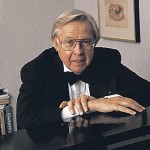Column Name
Title
This spring marks several important events in the life of Charles Wadsworth (B.S. ’51, M.S. ’52, piano). Not only does he achieve octogenarian status this month, but he will also be retiring—though, for this enthusiastic, energetic, and dedicated man who has become one of America’s most beloved figures on the chamber music scene, retirement applies only to his most public and intense posts.
Body
Stepping down as artistic director of the Spoleto USA Festival at the end of this season, after 30 years in this post, Wadsworth actually boasts 50 consecutive years of involvement with Spoleto—first in Italy at the Festival of Two Worlds, under the direction of Gian Carlo Menotti. There he developed the daily chamber music concert series, which has transferred to the Charleston, S.C., site and become one of the main thrusts of the festival.
This native of Newnan, Ga., is often credited with giving chamber music the revered and respected status it now holds in America. Approached by William Schuman in the 1960s about creating a constituent of Lincoln Center devoted solely to this repertoire, Wadsworth worked tirelessly to bring together extraordinary musicians to form the Lincoln Center Chamber Music Society, which he directed for 20 years.
Uniting musicians and audience members has been the true focus of Wadsworth’s career. As he explained in a recent interview, “I am always looking for people who love the idea of playing chamber music but are also tremendous soloists. That is the ideal for me. I want anybody I work with to have the ability to connect themselves with people in a very personal way, and then be able to work with other musicians who all have the same qualities.”
Over the years, he has collaborated with artists such as Leonard Bernstein, Pierre Boulez, Samuel Barber, John Corigliano, Emanuel Ax, Richard Goode, Pinchas Zukerman, and Yo-Yo Ma. He also frequently performed as a pianist with singers Jessye Norman, Frederica von Stade, Beverly Sills, Kathleen Battle, and Dietrich Fischer-Dieskau. Through his various roles in artistic leadership and concert presenting, he has programmed literally thousands of chamber music concerts.
Wadsworth is known and loved for his ability to relate to his colleagues and audience members, and especially for his jovial manner and relaxed stage presence. He admits that this skill is especially important for classical music during these times. “Musicians now need to connect even more with their public, which helps the public connect with what the musicians are doing,” he says. “I have the audience relate to me—so they know that I’m one of them, and we’re all in this wonderful occasion together.”
From his first days at Spoleto, Wadsworth learned the value of humor on stage. “The minute people laugh, you can see a difference in those people and what they’re ready for. They become ready to accept what the musicians are doing.” This levity and comfort then translates to the performance, he says. “I’ve found that the musicians I’ve worked with start to get the same feeling that I have about them, and that the audience has about me. It all connects.”
He realizes this may not be natural for all performers, but suggests all performers “can discover something they use privately to make contact with people, something that works in terms of the way people receive them and what they’re saying. Then they can be loose enough to let that happen on stage. Experiencing a personal connection really pulls people in.”
Wadsworth is also the artistic director of the Musical Masterworks chamber music concert series, which tours throughout the U.S., and the founding artistic director of the Festival Internacional de Música in Cartagena, Colombia. Though he will be leaving these positions as well after this season, due to the “ongoing pressure of a high-stress job,” and the fact that he really “hates airports and air travel,” we will thankfully still be seeing him in the performing arena. He is looking forward to doing single-city concerts (rather than exhausting extended tours), as well as giving lectures on his life as a performer and concert presenter. He is also relishing the idea of revisiting some of his earlier original musical compositions—which he describes as “crossover in style”—and having some “quiet time to put some more stuff on paper.”
Even with his remarkably successful career, Wadsworth still attributes its origin and unfolding to chance, recalling various performances and situations that he was “lucky enough” to seize. But he strongly urges young performers to seek constantly the personal connection and commitment of which his career is exemplary. “For any musician, so much of what happens to you has to do with timing—but also being enormously prepared,” he says. “Even if you’re just sitting in the orchestra pit and accompanying a singer on stage, you must be doing something. You must be giving everything you’ve got in that moment to the music. And so, if you’re ready and the chance meeting occurs, then it can work out very excitingly.”





